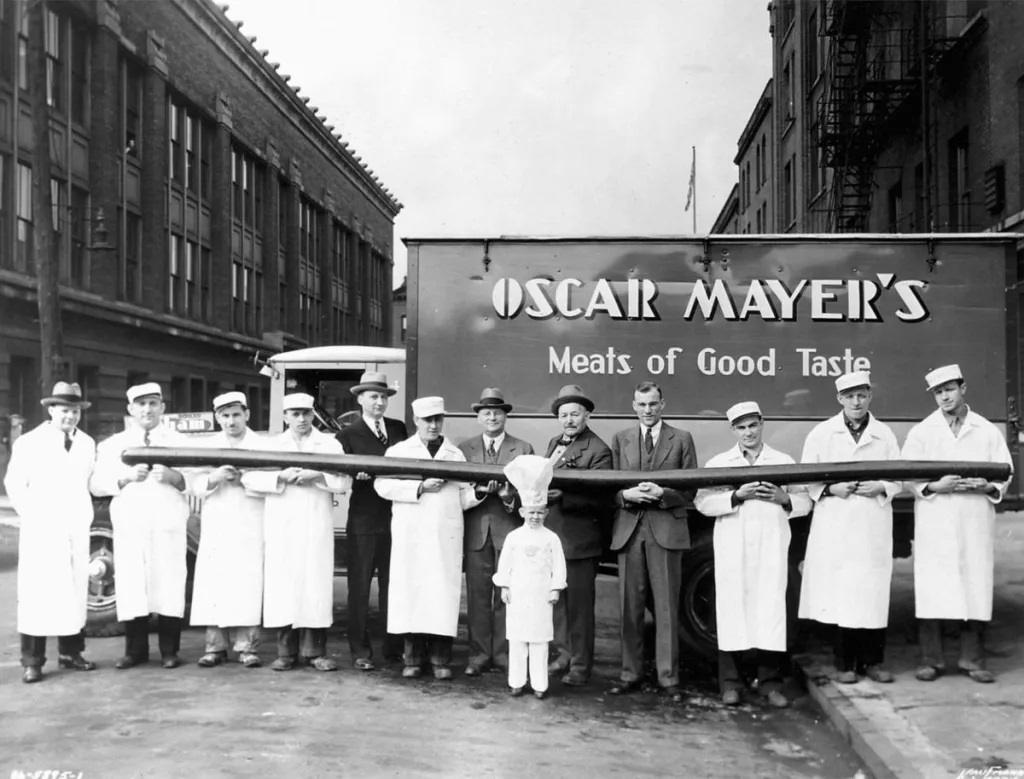The couple had five children, with Oscar Gottfried Mayer being the eldest and only son. Later, Frieda, Louise, Elsie, and Eugenia were born, who indirectly also contributed to the expansion of the business.
Oscar Mayer, in the center of the image, with company workers holding a large sausage.
After facing serious issues with his landlord, Oscar decided to take out a $10,000 loan to buy a plot of land just two blocks away from his first shop, as he didn't want to move too far to not lose his established clientele. So in 1888, he reopened the business. By then, a third brother named Max arrived from Germany. It's not surprising that they were a hit considering that, according to the 1900 census, one in four residents in Chicago was born in Germany or had at least one parent born there. They were fortunate that the Irish, the second-largest community, also loved sausages. By the early 20th century, Oscar Mayer employed 43 people and eight horse-drawn wagons that were responsible for deliveries to 280 stores in Chicago and the suburbs.
It's noteworthy that at that time, consumers bought based on trust in the shopkeepers, but didn't know who the manufacturers were, so the secret had to be kept for a while until retail brands in food advertising began to gain prominence. It wasn't until 1904 that Oscar Mayer put his brand on the products.
After Oscar G. Mayer graduated from Harvard University in 1909, the young man joined the business. He was instrumental in transforming the company from a small regional business to becoming the leading national manufacturer of processed meats as a registered trademark. The executive learned the business from scratch, as after finishing his studies, he worked in his father's shop preparing orders and making deliveries. Living above the shop meant he witnessed the business's evolution firsthand and strengthened the relationship with the employees.
In 1912, the company began replacing horses with Ford vehicles, whose founder was the entrepreneur Henry Ford in 1888. Just over three decades after the opening of the first shop, Oscar Mayer achieved sales of 11 million dollars in a year, with a third of it coming from government purchases for the U.S. military during World War I.
Among the most notable achievements after the war was the introduction in 1924 of sliced bacon in a suitable plastic package. In 1929, sausages with a yellow paper band bearing the company's name were manually wrapped, a significant step from a commercial standpoint, as until then, sausages were sold in bulk, and in 1936, they came up with a remarkable advertising stunt by building a custom-made car that looked like a giant sausage on a truck body with wheels, which they named the Wienermobile. From that moment on, it became the symbol of the sausage empire.
By then, Oscar Mayer had fallen into a deep depression, as his wife passed away in 1931 at the age of 67. Despite those tough times, he didn't neglect his philanthropic duties, sponsored various events, and dabbled in politics. He passed away in 1955 at the age of 95. His son Oscar continued in the business until they sold the company to the conglomerate General Foods Corporation for nearly 465 million dollars in 1981. He also passed away at the age of 95 in 2009.
Oscar's great-grandson is the American activist Chuck Collins, who at the age of 26 inherited 500,000 dollars, which he donated to various foundations for social causes.
